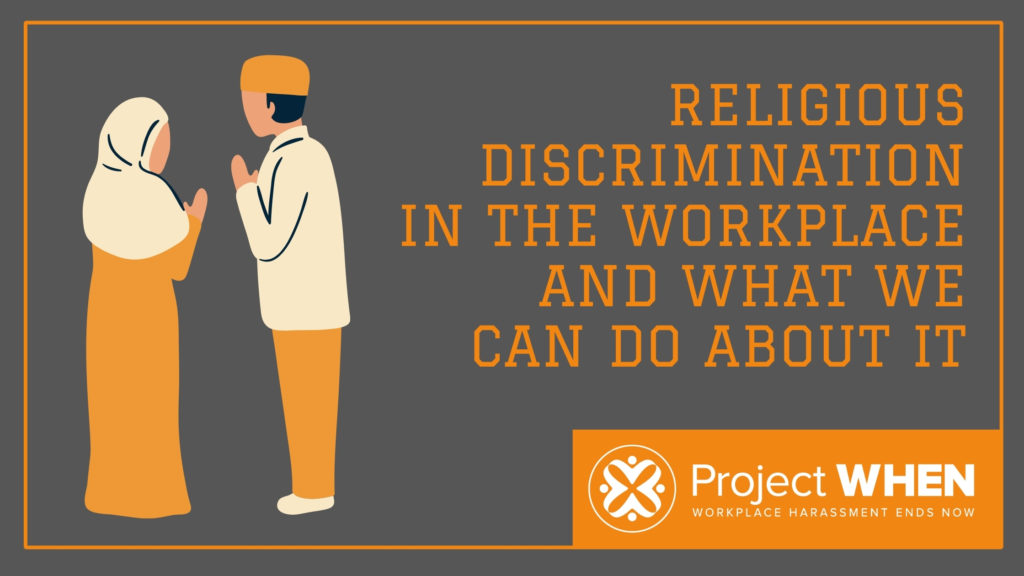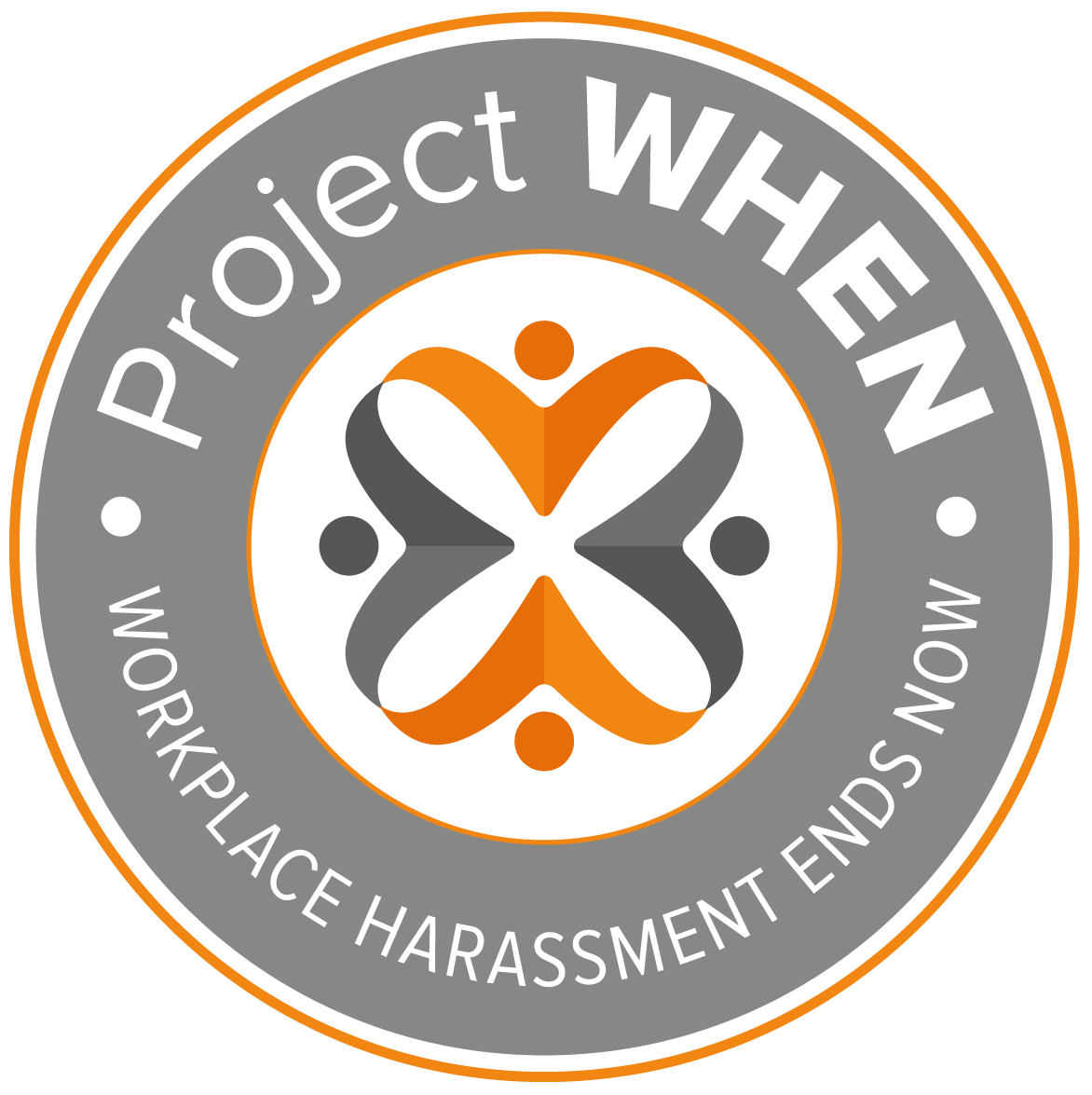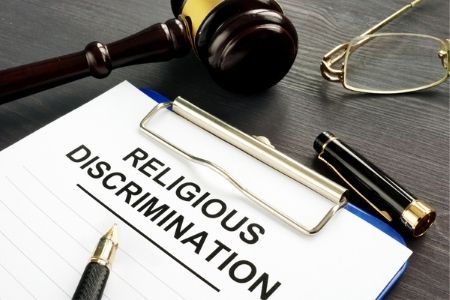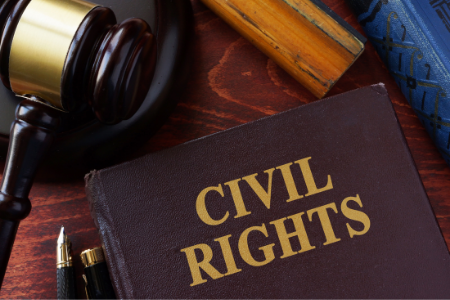Religious discrimination in the workplace: How companies can prevent it and what employees can do if it happens

Awareness against religious discrimination
 Are you a victim of religious discrimination or have you observed it happening in your workplace? Let’s explore some facts that you should know in order to handle it.
Are you a victim of religious discrimination or have you observed it happening in your workplace? Let’s explore some facts that you should know in order to handle it.
Our mission at Project WHEN (Workplace Harassment Ends Now) is to elevate awareness to eliminate harassment and create more respectful workplaces. This post on religious discrimination is part of our series of pages educating the public about various types of workplace harassment, how employers can prevent it, and employees’ rights under the law.
What is religious discrimination in the workplace?
 Religious discrimination occurs when an applicant or employee is treated unfairly because of the person’s religion, including religious beliefs, practices, grooming, attire, or lack thereof. It can also happen because of association (such as marriage) with someone of a certain religion.
Religious discrimination occurs when an applicant or employee is treated unfairly because of the person’s religion, including religious beliefs, practices, grooming, attire, or lack thereof. It can also happen because of association (such as marriage) with someone of a certain religion.
In this post, we’ll touch on real examples of religious discrimination, the laws offering protection from it, and the recourse victims have under the law. Importantly, we’ll also cover what employers can do to prevent it from occurring in the workplace, along with delving into what companies should do to address religious discrimination claims. You’ll also find a number of resources we feel are helpful for those dealing with this problem.
Examples of religious discrimination
Discrimination based on one’s religion or religious beliefs and practices can happen in many ways. Individuals may experience being deprived of their right to be able to execute their religious practices. Such was the case with a long-term dedicated phlebotomist who worked at a medical diagnostic information services provider. As a Seventh-day Adventist, she is unavailable to work on Friday evening to Saturday evening for her Sabbath observance. It had not been an issue for the first ten years of her employment but in her 11th year, the company decided to revoke the accommodation provided to her. After being forced to call “out” on her Saturday shifts, the company dismissed her from the job.
Some individuals may suffer discrimination because of their adherence to religious grooming. Recently, an Orlando-based restaurant settled a religious discrimination lawsuit by paying thousands of dollars to a Jewish applicant, among other penalties and legal requirements. The applicant was rejected from a part-time maintenance position simply because he refused to shave his beard in compliance with the restaurant’s “completely clean-shaven” grooming policy.
Additionally, the company ignored the applicant’s offer to wear a beard net. The restaurant even added an application requirement for applicants to certify their compliance with the restaurant’s grooming standards after the Jewish worker reported the alleged conduct to a federal agency.
These examples are based on real cases handled by the U.S. Equal Employment Opportunity Commission (EEOC), a federal agency responsible for enforcing employment discrimination laws.
Statistics on religious discrimination
Every year, the EEOC receives thousands of religion-based discrimination filings. Charges filed and resolved with the federal agency alleging religious discrimination reached 2,725 in fiscal year 2019 which decreased slightly compared to records in FY 2018. This figure does not include charges filed with state or local Fair Employment Agencies, not to mention incidents that go unreported.
Being discriminated against because of practicing a religion is still a reality that many religious members of the labor force face. Employers may think that their actions do not have serious consequences and victims may not have a clear understanding of protections available to them. Awareness is of utmost importance, first and foremost, in these situations. Read on to explore what laws protect you from it, as well as key actions to take by both companies and victims in dealing with this type of discrimination.
Religious discrimination laws
Federal law
 Title VII of the Civil Rights Act of 1964 is a federal law that prohibits employment discrimination on the basis of religion, as well as race, color, sex, and national origin. Employers may not treat individuals (applicants or employees) unfavorably because of their religion in employment aspects — including but not limited to hiring, firing, compensation, job assignments, promotions, layoff, training, and benefits.
Title VII of the Civil Rights Act of 1964 is a federal law that prohibits employment discrimination on the basis of religion, as well as race, color, sex, and national origin. Employers may not treat individuals (applicants or employees) unfavorably because of their religion in employment aspects — including but not limited to hiring, firing, compensation, job assignments, promotions, layoff, training, and benefits.
In addition, an employer may not practice unfair occupational segregation in which employees are systematically distributed in job types or posts based on their religion, religious beliefs, practices, or grooming. For instance, it is illegal to assign an employee to an undesirable position that limits customer interaction in fear of losing client loyalty over an employee who wears Muslim hijab.
As long as it does not cause significant loss or difficulty, employers are legally required to make reasonable accommodations for applicants or employees to freely practice their religion. Accommodations can include offering flexibility or adjusting an employee’s schedule so that it does not coincide with his Sabbath day observance. It can also be in the form of allowing exceptions to any dress code or grooming standards so that employees can freely wear religious garments.
The law also protects people from being harassed because of their religion. Harassment can take the form of humiliation, derogatory remarks, offensive drawings / illustrations, and unwelcome physical conduct.
It is important to note, however, that one-off teasing and isolated incidents (unless extremely serious) may not be considered illegal. The unwanted behavior must create a threatening and hostile work environment or result in adverse employment action to be unlawful. Harassment can occur between an employee and a supervisor, manager, coworker, and a non-employee (clients or vendors).
Another main provision this law offers is protection against retaliation. An employer may not punish or retaliate against an individual who is actively asserting his/her rights. Protected activities include filing a discrimination charge, using complaint processes to oppose discriminatory practices, and participating in legal proceedings or investigations alleging workplace harassment.
The legal requirements apply to business/private employers with 15 or more employees, employment agencies, state or local governments, federal government agencies, and labor organizations or joint apprenticeship committees. The law’s protection extends not only to those who are members of traditional religions (Christianity, Buddhism, Hinduism, Islam, Judaism, Taoism, etc.) but also to those who hold sincere religious, ethical, or moral beliefs.
Below is an excerpt from Title VII of the Civil Rights Act of 1964 pertaining to religious discrimination.
|
Title VII of the Civil Rights Act of 1964 DISCRIMINATION BECAUSE OF RACE, COLOR, RELIGION, SEX, OR NATIONAL ORIGIN SEC. 703. (a) It shall be an unlawful employment practice for an employer– (1) to fail or refuse to hire or to discharge any individual, or otherwise to discriminate against any individual with respect to his compensation, terms, conditions, or privileges of employment, because of such individual’s race, color, religion, sex, or national origin; or (2) to limit, segregate, or classify his employees in any way which would deprive or tend to deprive any individual of employment opportunities or otherwise adversely affect his status as an employee, because of such individual’s race, color, religion, sex, or national origin. (b) It shall be an unlawful employment practice for an employment agency to fail or refuse to refer for employment, or otherwise to discriminate against, any individual because of his race, color, religion, sex, or national origin, or to classify or refer for employment any individual on the basis of his race, color, religion, sex, or national origin. (c) It shall be an unlawful employment practice for a labor organization– (1) to exclude or to expel from its membership, or otherwise to discriminate against, any individual because of his race, color, religion, sex, or national origin; (2) to limit, segregate, or classify its membership, or to classify or fail or refuse to refer for employment any individual, in any way which would deprive or tend to deprive any individual of employment opportunities, or would limit such employment opportunities or otherwise adversely affect his status as an employee or as an applicant for employment, because of such individual’s race, color, religion, sex, or national origin; or (3) to cause or attempt to cause an employer to discriminate against an individual in violation of this section. (d) It shall be an unlawful employment practice for any employer, labor organization, or joint labor-management committee controlling apprenticeship or other training or retraining, including on-the-job training programs to discriminate against any individual because of his race, color, religion, sex, or national origin in admission to, or employment in, any program established to provide apprenticeship or other training. |
State Law
Some states have laws that protect individuals from religious discrimination. The best way to learn more about additional protections you can receive locally is to refer to your state’s department of labor website. Our guide on reporting incidents of workplace harassment links to each state’s DOL website, as well as some of the regional and city organizations, for those in more populous areas.
Recourse for victims of religious discrimination
If an applicant or employee believes that his/her religious rights have been violated in the workplace, documenting experiences or keeping evidence of the offensive conduct is essential. It is also encouraged to use any complaint or reporting system internally. Even concerned colleagues or witnesses can report the incident. But if the complaint has fallen on deaf ears or has led to worse treatment (even punishment), victims have the right to seek legal recourse.
One of the available options is to consult legal counsel or an employment lawyer. These professionals can help the aggrieved individual in evaluating the case and offer valuable advice regarding the claims.
A best next step could also be filing a charge either through a state administrative agency or the EEOC, a federal agency that enforces federal laws related to harassment and discrimination in the workplace. Acting promptly is important since there is a time limit of 180 days to file an EEOC charge. Federal applicants and employees have 45 days to initiate EEO counseling.
Speaking with an attorney is not a requirement before approaching a government agency to discuss the situation; these entities are in place to protect applicants’ / employees’ rights and are typically willing to give guidance on suggested next steps for victims.
For more information about the process of reporting religious discrimination cases, refer to our full guide on How to Report Workplace Harassment Incidents. This article provides a comprehensive list of state resources and local EEOC offices. You can also head directly to the EEOC’s page on How to File a Charge of Employment Discrimination.
What can companies do to prevent religious discrimination?
Companies have the responsibility to prevent religious discrimination from transpiring in the workplace. Compliance with law requirements as an initial step is of utmost importance. A holistic examination of business processes and culture also needs to be done to develop a respectful work environment.
The initiative to prevent religious discrimination is most effective when it starts with senior leadership, but sometimes change takes one individual who has the courage to speak up. Employers that are passionate about ensuring the safety of employees from the different manifestations of discrimination should consider getting involved with Project WHEN (Workplace Harassment Ends Now).
 As a first step, we’d ask employers to sign our Pledge of Commitment to demonstrate their commitment to creating a respectful, harassment-free workplace for employees.
As a first step, we’d ask employers to sign our Pledge of Commitment to demonstrate their commitment to creating a respectful, harassment-free workplace for employees.
For a holistic and structured approach to living out the company’s commitment, we also encourage employers to enroll in the WHEN™ Organizational Certification program. In this program, we will guide the company through a step-by-step process of preventing all types of workplace harassment. This certification will also serve as a powerful statement to both internal and external audiences about the company’s commitment to ensuring that the workplace is a safe space for everyone. The Employee Culture Pulse Survey, which is also offered as a standalone service, will be administered to employees in the first phase of this program. The actionable data gained from this survey will allow you to identify challenges in your fight against workplace harassment and strategize your path to improvement.
What should companies do when religious discrimination happens?
Acts of discrimination happen when companies lack understanding of requirements set forth by the law and do not implement preventive measures. When tell-tale signs of hostility are observed within the organization, it is time to start dismantling it by engaging in meaningful conversations and breaking the status quo.
As an employer, if you are ready to begin discussions on creating a more respectful work environment, we can facilitate a Project WHEN Roundtable. This event can help attendees identify challenges present in their current working conditions and gain insight on the best action steps to eliminate traces of discrimination in the workplace.
If you are a concerned individual who thinks that it is time to see change happening in your company, let your employer know about this and ask for a facilitated discussion to take place.
Remember, the problem of religious discrimination will not solve itself. It is important for everyone to develop heightened awareness of what they can do to make a difference. Change will only take place if people within the workplace take the initiative to address issues, no matter how uncomfortable it may be.
Additional resources and recommended readings
For more information about religious discrimination, we’ve rounded up some resources that you can consult and find below.
- Religious Discrimination | U.S. Equal Employment Opportunity Commission
- Fact Sheet: Religious Discrimination
- Religious Discrimination – FAQs
- Questions and Answers: Religious Discrimination in the Workplace
- Best Practices for Eradicating Religious Discrimination in the Workplace
End religious discrimination now
Nobody should have to face religious discrimination or any form of harassment, for that matter. Project WHEN is a 501(c)(3) nonprofit organization working hard to make workplaces more respectful for everyone. Elevating awareness to prevent workplace harassment from taking place is what runs at the core of our organization.
Whether you’d like to make a financial contribution to support our work, sign the Project WHEN Pledge of Commitment, have your employer host a Project WHEN event, or just join our mailing list to learn of volunteer opportunities, everyone can get involved with Project WHEN!
Examples of Religious Discrimination in Various Industries
Religious Discrimination is a prevalent issue that happens in different workplace settings. Here are some examples of the religious discrimination issues the workplace is currently facing:
Religious Discrimination at Google – 07/16/2021
Amr Awadallah, Google Cloud’s vice president of developer relations, resigned following the publication of a LinkedIn manifesto on Israeli-Palestinian relations and his fiercely antisemitic history. Google, like other technology companies, has seen an increase in internal conflict in recent years. Employees have responded to allegations of prejudice and sexual harassment.

